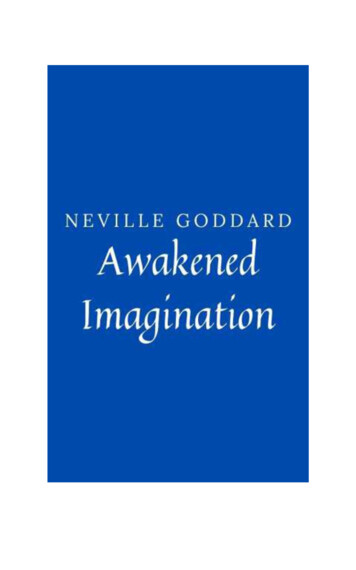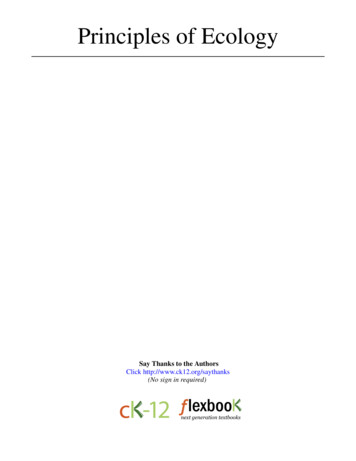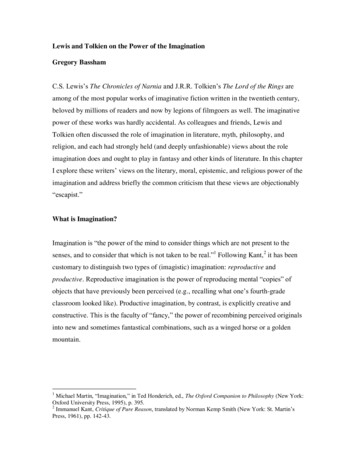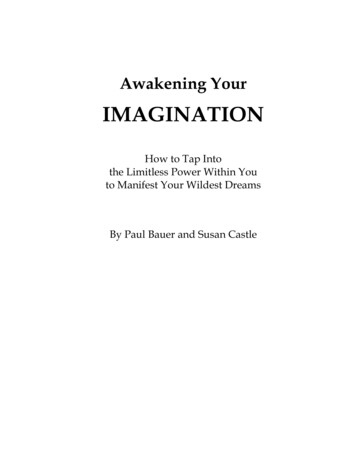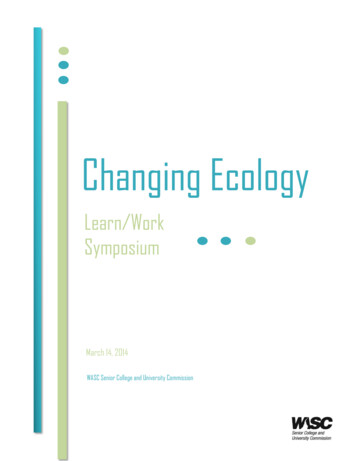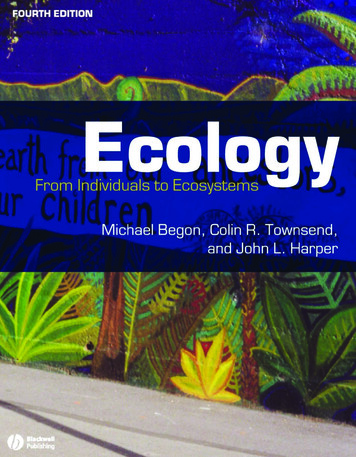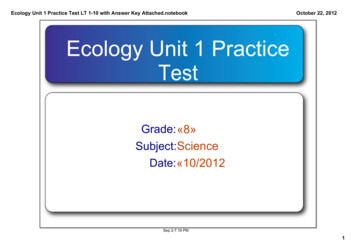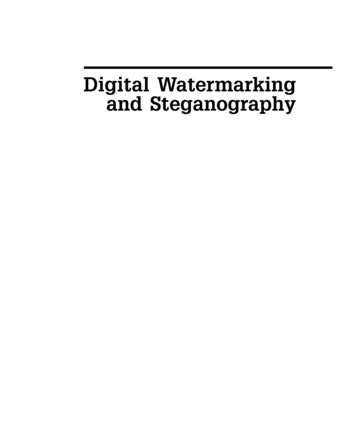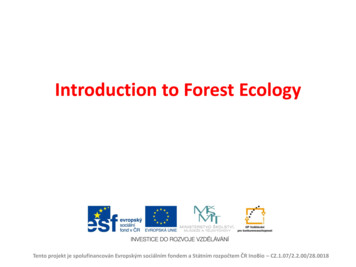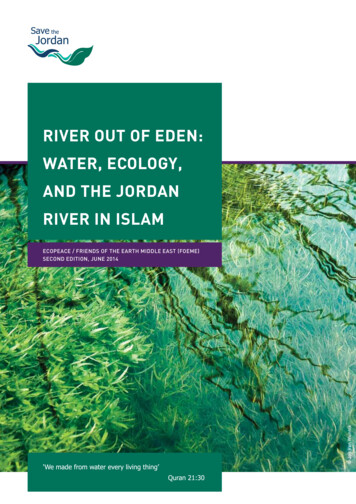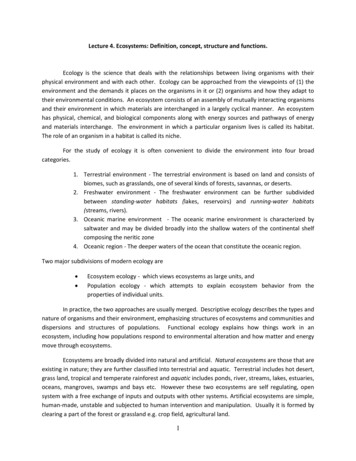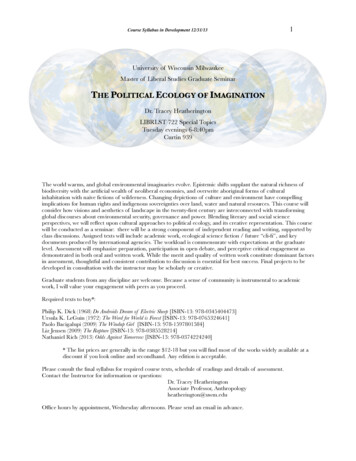
Transcription
Course Syllabus in Development 12/31/131University of Wisconsin MilwaukeeMaster of Liberal Studies Graduate SeminarTHE POLITICAL ECOLOGY OF IMAGINATIONDr. Tracey HeatheringtonLIBRLST 722 Special TopicsTuesday evenings 6-8:40pmCurtin 939The world warms, and global environmental imaginaries evolve. Epistemic shifts supplant the natural richness ofbiodiversity with the artificial wealth of neoliberal economies, and overwrite aboriginal forms of culturalinhabitation with naïve fictions of wilderness. Changing depictions of culture and environment have compellingimplications for human rights and indigenous sovereignties over land, water and natural resources. This course willconsider how visions and aesthetics of landscape in the twenty-first century are interconnected with transformingglobal discourses about environmental security, governance and power. Blending literary and social scienceperspectives, we will reflect upon cultural approaches to political ecology, and its creative representation. This coursewill be conducted as a seminar: there will be a strong component of independent reading and writing, supported byclass discussions. Assigned texts will include academic work, ecological science fiction / future “cli-fi”, and keydocuments produced by international agencies. The workload is commensurate with expectations at the graduatelevel. Assessment will emphasize preparation, participation in open debate, and perceptive critical engagement asdemonstrated in both oral and written work. While the merit and quality of written work constitute dominant factorsin assessment, thoughtful and consistent contribution to discussion is essential for best success. Final projects to bedeveloped in consultation with the instructor may be scholarly or creative.Graduate students from any discipline are welcome. Because a sense of community is instrumental to academicwork, I will value your engagement with peers as you proceed.Required texts to buy*:Philip K. Dick (1968) Do Androids Dream of Electric Sheep [ISBN-13: 978-0345404473]Ursula K. LeGuin (1972) The Word for World is Forest [ISBN-13: 978-0765324641]Paolo Bacigalupi (2009) The Windup Girl [ISBN-13: 978-1597801584]Liz Jensen (2009) The Rapture [ISBN-13: 978-0385528214]Nathaniel Rich (2013) Odds Against Tomorrow [ISBN-13: 978-0374224240]* The list prices are generally in the range 12-18 but you will find most of the works widely available at adiscount if you look online and secondhand. Any edition is acceptable.Please consult the final syllabus for required course texts, schedule of readings and details of assessment.Contact the Instructor for information or questions:Dr. Tracey HeatheringtonAssociate Professor, Anthropologyheatherington@uwm.eduOffice hours by appointment, Wednesday afternoons. Please send an email in advance.
MLS 722— THE POLITICAL ECOLOGY OF IMAGINATION2Schedule of Readings & AssignmentsJan 21-- first day of class Begin Philip K. Dick (1968) Do Androids Dream of Electric SheepJan. 28 -Skim: Club of Rome (1972) The Limits of Growth. http://www.clubofrome.org/?p 326 United Nations Environment Program (1972) Declaration of the United Nations Conference on Human Environment. .asp?documentid 97&articleid 1503 Film: Last Call (2013) http://www.lastcallthefilm.org Feb. 3 -- Assignment: Finish Philip K. Dick (1968) Do Androids Dream of Electric Sheep and write a 3-5pp. responsediscussing ecological themes in the book.Feb. 10 - Excerpt, Philip Wylie (1972) The End of the Dream. Excerpt, Ernest Yanarella (2001) The Cross, The Plow and the Skyline: Contemporary Science Fiction and the EcologicalImagination Stableford, Brian, 2008. “Ecology and Science Fiction” pp. 127-141 in David Seed, ed., A Companion to Science Fiction.Blackwell.Feb. 18 - Ursula K. LeGuin (1972) The Word for World is ForestFeb. 25 -- Assignment in lieu of class: Drawing upon the ideas presented by the Club of Rome’s report, The Limits ofGrowth, write a 3-5pp. commentary discussing how science fiction of the 1970s reflects emerging global ecologicalconcerns and understandings of the time.Mar. 4 -Skim: World Commission on Environment and Development (1987) Our Common Future. http://www.un-documents.net/wced-ocf.htm United Nations Conference on Environment and Development (1992) Agenda 21 ents/Agenda21.pdf Millennium Ecosystem Assessment (2005) Ecosystems and Human Well-Being http://www.unep.org/maweb/en/Reports.aspx Film: Crude (2009) http://www.crudethemovie.com Mar. 11 --1-2pp final paper proposals due; should include annotated bibliography Begin Paolo Bacigalupi (2009) The Windup GirlMar. 18 -- break
MLS 722— THE POLITICAL ECOLOGY OF IMAGINATION3Mar. 25 --Assignment: Finish Paolo Bacigalupi (2009) The Windup Girl and consider new ecological themes apparent,write a 3-5pp. commentary commenting on the connections apparent with developing international debates.Skim: Global Humanitarian Forum (2009) Human Impact Report on Climate Change http://www.ghf-ge.org Apr. 1 - Tuhus-Dubrow, Rebecca. 2013. “Cli-fi: Birth of a genre” Dissent: A Quarterly of Politics and Culture Begin Liz Jensen (2009) The RaptureApr. 8 -Skim: World Bank (2012) Turn Down the Heat avoided Intergovernmental Panel on Climate Change (2012) Managing Risks of Extreme Events and Disasters to Advance ClimateChange Adaptation http://ipcc-wg2.gov/SREX/ Robinson, Kim Stanley, Gerry Canavan, Lisa Klarr, and Ryan Vu. 2010. “Science, Justice, Science Fiction: AConversation with Kim Stanley Robinson.” Polygraph: An International Journal of Culture & Politics 22 (Ecology &Ideology): 201-218.Film: The Island President (2011) http://theislandpresident.com Apr. 15 --Individual presentations on final projects; paper drafts due. Finish Liz Jensen (2009) The RaptureApr. 22 - Begin Nathaniel Rich (2013) Odds Against TomorrowSkim: United Nations Conference on Sustainable Development (2012) Rio 20 Final Report D%20REPORT%20final%20revs.pdf Intergovernmental Panel on Climate Change (2013-14) Fifth Assessment Report http://www.ipcc.ch Apr. 29 - Graeber, David. 2011. “Against Kamikaze Capitalism” pp. 107-113 in Revolutions in Reverse. Minor Compositions. Kim Stanley Robinson (2005) “Prometheus Unbound, At Last” in Nature China Mieville (2012) “Covehithe” in The GuardianFilm: The Yes Men Fix the World (2009)May 6 -- last day of classFinish Nathaniel Rich (2013) Odds Against TomorrowMay 13 --final essay projects due
MLS 722— THE POLITICAL ECOLOGY OF IMAGINATION4Course requirements and expectations*20% of assessed work for this course is comprised of ongoing discussions in class. You should demonstrate thoughtfulengagement with all the course materials, and a willingness to brainstorm and exchange ideas with peers. It goeswithout saying that at the graduate level, regular (generally punctual) attendance, preparation and participation isexpected, so please email if you are occasionally unable to attend because of illness or emergency. Please avoidscheduling other obligations during class time.25% of your final grade is contributed by short assignments due Feb. 3 (5%), Feb. 25 (10%), Mar. 25 (10%). Theseare formal writing exercises of 3-5pp double-spaced, engaging with assigned readings. Citation practice is expected.You may be asked to share these with peers. Feedback is provided.Individually, in consultation with the instructor, each student will develop an independent research project throughsuccessive phases to a final written essay form of approximately 8,000 words. With permission of the instructor, youmay choose to fulfill this portion of assessment with a sci-fi or “blurred genre” creative writing project. Students areencouraged and welcomed to consult after class or book an appointment for office hours Wednesday afternoons.5% of your final course grade is earned automatically by submitting a written 1-2pp paper proposal brieflyannotated bibliography, on or before Mar. 11. There should be a clear explanation of the project, and materialsexpected to be used. Your project may change somewhat before it is complete, but you should commit to a generaldirection by this time.10% of your final course grade is earned by discussing the project in class and submitting a paper draft (at least4,000 words with formal citations) by April 15. Feedback on the first draft will be provided within two weeks to assistyou with the final draft.The remaining 40% of your grade is determined by the quality of your final class project. There is scope to explorebut the focus of the project should be reasonably consistent with the concerns of the course. You are encouraged tomake use of course materials, particularly from the second half of the semester, to compliment your research.Final essay project, option 1:Academic paper (about 8,000 words) related to the topic of science fiction and contemporary ecologicalconcerns, such as climate change, fresh water scarcity, global environmental justice, energy paradigms,decline of biodiversity, etc. In-text citations and as well as a list of references cited should be used.Final essay project, option 2:A sci-fi or “blurred genre” creative writing project embedding critical insights on political ecology within a6,000-7,000 word narrative accessible to a general audience, appending an explanatory afterward &annotated bibliography of 1,000-2,000 words to demonstrate quality scholarship and intellectual merit.An extensive list of recommended resources is attached. You are encouraged to seek out research materials and readacross fields, especially the humanities and social sciences, but you must also show that you know what you’rereading. It is vital to recognize not only the synergies of different disciplines, but also the differences in intellectualformation and methodological frameworks that underpin them. If you choose to explore beyond your field,remember that the audiences and goals of these works, their expectations and assumptions, as well as their methodsand analytical languages, may be quite different. In order to draw from these works, you must learn to understandthem in their own terms as well as yours.If you have a valid reason for submitting an assignment late, there is generally a two-day “grace” period, providedthat you come and participate in class. Please do not skip class in order to finish an assignment; it will count as late.Late assignments may be accepted within two weeks, with a one grade-step penalty per week and reduced feedback.* If you have a student visa, let me know what you need.As always, academic integrity is paramount. UWM student rights and responsibilities can be found here:http://www4.uwm.edu/secu/news events/upload/SyllabusLinks.pdf
MLS 722— THE POLITICAL ECOLOGY OF IMAGINATIONGeneral List of Resources —Documents— (available online)United Nations Environment Program (1972) Declarationof the United Nations Conference on Human Environment. .asp?documentid 97&articleid 1503 Club of Rome (1972) The Limits of Growth. http://www.clubofrome.org/?p 326 World Commission on Environment and Development(1987) Our Common Future. http://www.un-documents.net/wced-ocf.htm United Nations Conference on Environment andDevelopment (1992) Agenda 21 ents/Agenda21.pdf Millennium Ecosystem Assessment (2005) Ecosystems andHuman Well-Being http://www.unep.org/maweb/en/Reports.aspx Global Humanitarian Forum (2009) Human Impact Reporton Climate Change http://www.ghf-ge.org World Bank (2012) Turn Down the Heat avoided Intergovernmental Panel on Climate Change (2012)Managing Risks of Extreme Events and Disasters to AdvanceClimate Change Adaptation http://ipcc-wg2.gov/SREX/ United Nations Conference on SustainableDevelopment (2012) Rio 20 Final Report D%20REPORT%20final%20revs.pdf Intergovernmental Panel on Climate Change (2013-14)Fifth Assessment Report http://www.ipcc.ch Academic Non-fiction (on library reserve)William Cronon, ed. (1995) Uncommon Ground: Rethinkingthe Human Place in NatureErnest Yanarella (2001) The Cross, The Plow and theSkyline: Contemporary Science Fiction and the EcologicalImaginationEdward James and Farah Mendelsohn, eds., (2003) TheCambridge Companion to Science FictionMichael Fischer (2003) Emergent Forms of Life and theAnthropological VoiceFrederic Jameson (2005) Archaeologies of the Future: TheDesire Called Utopia and Other Science FictionsAletta Biersack and James B. Greenberg (2006)Reimagining Political EcologyUrsula K. Heise (2008) Sense of Place and Sense of Planet:The Environmental Imagination of the GlobalSusan A. Crate and Marc Nuttall, eds., (2009) TheAnthropology of Climate ChangeLawrence Buell (2009) The Future of EnvironmentalCriticismStefan Scrimshire, ed., (2010) Future Ethics: ClimateChange and Apocalyptic ImaginationElizabeth DeLoughrey and George B. Handley, eds.,(2011) Postcolonial Ecologies: Literatures of the Environment5Kirsten Hastrup and Karen Fog Olwig, eds., (2011)Climate Change and Human Mobility: Challenges to the SocialSciencesMichael Dove, ed., (2014) The Anthropology of ClimateChange: An Historical Reader.Fiction— (required texts are marked*)Isaac Asimov (1954) The Caves of SteelJ.G. Ballard (1962) The Drowned World*Philip K. Dick (1968) Do Androids Dream of Electric SheepJohn Brunner (1968) Stand on ZanzibarPhilip Wylie (1971) End of the DreamIsaac Asimov (1972) The Gods ThemselvesJohn Brunner (1972) The Sheep Look Up*Ursula K. LeGuin (1972) The Word for World is ForestUrsula K. LeGuin (1974) The DispossessedJoan Sloncezewski (1985) A Door Into OceanElizabeth Hand (1997) The GlimmeringJeannette Winterson (2007) The Stone Gods*Paolo Bacigalupi (2009) The Windup GirlHamish MacDonald (2009) FinitudeRosie Chard (2009) The Seal Intestine Raincoat*Liz Jensen (2009) The RaptureIan McEwan (2010) SolarMargaret Atwood (2010) Oryx and CrakeMargaret Atwood, Paolo Bacigalupi et al. (2011) I’mwith the Bears: Short Stories from a Damaged PlanetRob Ziegler (2011) SeedKim Stanley Robinson (2012) 2312Dillon, Grace L., ed. (2012) Walking the Clouds: AnAnthology of Indigenous Science Fiction.Paolo Bacigalupi, Ursula K. LeGuin, et al. (2012) DiverseEnergiesPaolo Bacigalupi (2012) The Drowned Cities*Nathaniel Rich (2013) Odds Against TomorrowAdditional Articles, Commentaries, InterviewsGibson-Graham, J.K. 2008. “Diverse Economies:Performative Practices for Other Worlds.” Progress inHuman Geography 32 (5): 613–632.Thomas, Mary, Christian Abrahamsson, Geoff Mann,Richa Nagar, Tarun Kumar, Shiloh R. Krupar, JoséRomanillos, Wendy S. Shaw, Alessandra Bonazzi, andMichael Sutcliffe. 2011. “FictionalWorlds.” Environment and Planning D: Society & Space 29(3): 551.Films— (available in the library)On the Beach (1959--based on the novel by Neville Shute)Soylent Green (1973--based on the novel, Make Room, MakeRoom! by Harry Harrison)Threads (1984)Blue Gold: World Water Wars (2009) http://www.bluegoldworldwaterwars.com There Was Once An Island (2010) http://www.thereoncewasanisland.com
Stableford, Brian, 2008. “Ecology and Science Fiction” pp. 127-141 in David Seed, ed., A Companion to Science Fiction. Blackwell. Feb. 18 -- Ursula K. LeGuin (1972) The Word for World is Forest Feb. 25 -- Assignment in lieu of class: Drawing upon the id
